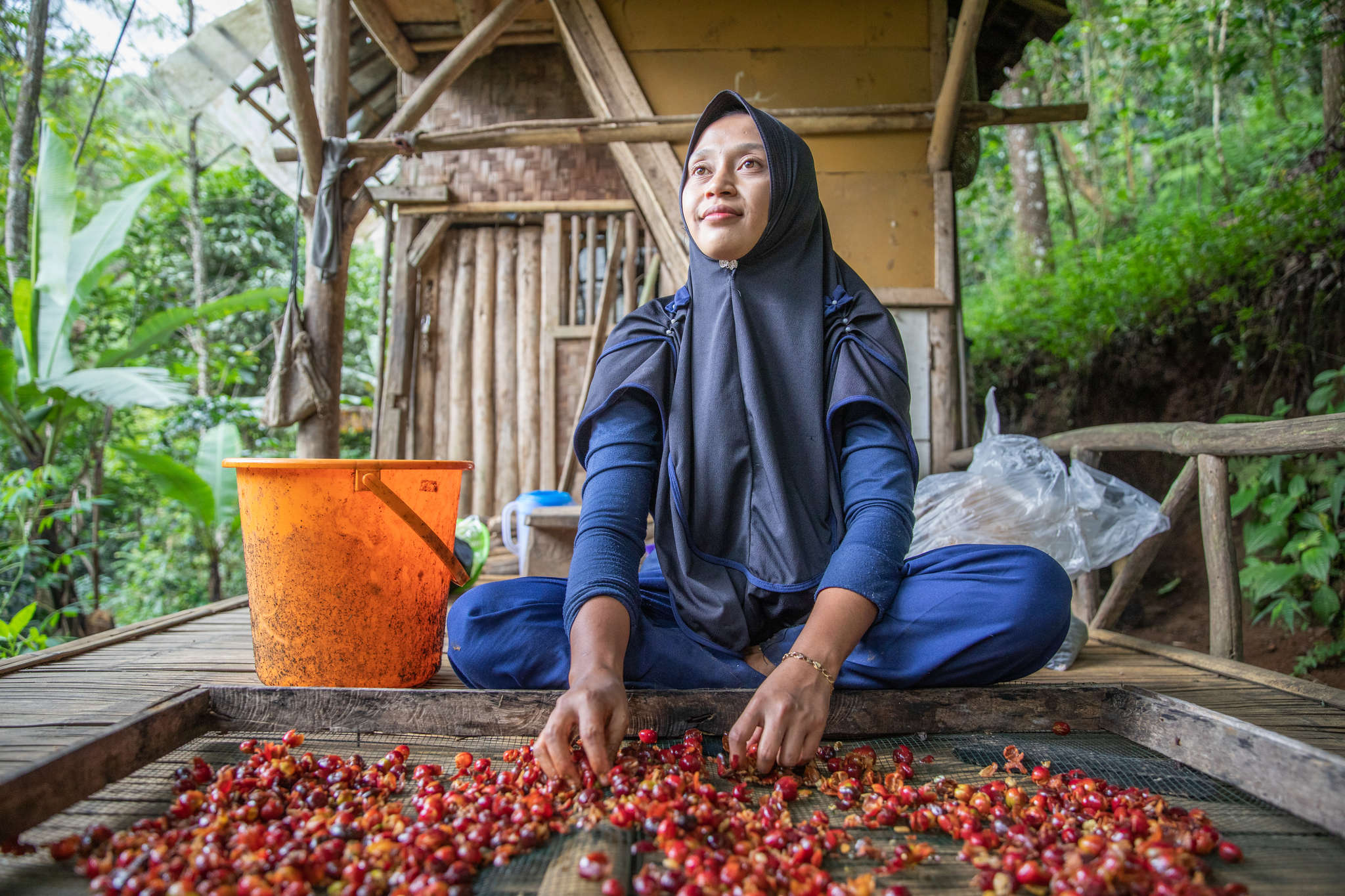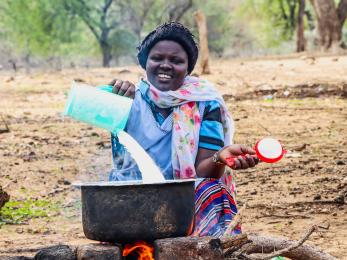"When suffering time comes, we have to suffer": Coping with hunger in Niger

Halima plays a lot of roles in her day-to-day life. A mother of three. A farmer. A caretaker. A chef, along with so many others.
Her work as a mother and provider for her family of five, which includes her husband and three children, has her working from sunrise to sunset every day.
Halima loves her community — she thinks it's a nice place to raise children and loves that her community is one that shares her values. However, things in her community were difficult before Mercy Corps' arrival.
"In this area, people's lives are based on agriculture, which does not answer their needs because of the rain," Halima says. "People constantly face drought, and that makes people suffer a lot."
Halima's village isn't alone. More than 75 percent of people in Niger, like Halima, who farms peanuts, okra and other crops, make a living in agriculture. Rampant drought leads to lower yield in essential crops and less available food for families like Halima's.
This means more children like Halima's are spending more days hungry. Even last night, Halima's family didn't have enough food to eat. They all went to bed hungry.
"There is nothing we can do even though it is a very bad feeling. When suffering time comes, we have to suffer," Halima says.
There's no easy way to solve the problems that hunger brings to Halima and families like hers. With each passing day, a new challenge arises.
The waiting game of the hunger gap
The last time Halima and her family had enough food to eat was in 2010. Since then, food shortages, drought and poverty have made it more and more difficult for Halima and families like hers to have access to plentiful, nourishing food.
Food shortages are hardest at the beginning of the rainy season, when food prices are marked up. Even now, food shortages are increasingly difficult. This is the time of year when farmers have planted their crops for the season, but the crops aren't ready to harvest or eat yet.
So they wait.
This is a relatively new phenomenon, according to Halima. Decreasing rainfall, possibly exacerbated by climate change, is decreasing the yield of crops and subsequently, the amount of food available for Halima and her family.
"It hasn't been like that all the time but in these recent years, it happens more and more. Things have become very complicated. We are having less rain than we used to have in the past," Halima says.
This year, the crops Halima and her family rely on will not have as plentiful a harvest as they've had in previous years.
"This year we are not expecting the harvest to be good. Talking about myself, as I said I have a field of peanuts. I used to have much but this year what I have is very little," Halima says. "It is just only for cooking what I harvested this year, so I haven't got enough to dry and save. In a day we can eat it whereas in the past I used to have a lot."
A desperate search for more income
When there's a particularly bad harvest, it directly affects their ability to live the happy, full lives they deserve.
Halima's husband has to travel to other communities to find work, leaving Halima alone to care for three children and the family home. Halima would leave with her husband if she could, but she doesn't have access to childcare. Instead, they trade off and take turns caring for the children.
"It has all the time an impact on the family, however, we try. During such times my husband goes out to some communities to try to have something to do, so that he may have something to assist the family," Halima says. "Myself, I can't leave as other women do, because nobody is going to take care of my kids. We just stay helpless. So you see, it is very hurtful and pitiful."

A month before the rainy season, it's Halima's turn to leave her family in search of work. She travels to a nearby village to work for money and rice to help her family prepare for the food shortages that come with the beginning of the rainy season.
"It is very difficult because when I leave, my husband has to live by himself, and there will be no one to do the household work like washing the kids, sweeping and carrying water, as my young daughter is not able to do all these," Halima says.
As the years go by Halima is still distraught every time she leaves — she doesn't want to, but she feels she must. Her family depends on her.
"I even cry while leaving the house, but I have no choice, it is an obligation," Halima says.
Halima is used to working tirelessly to support her family and has done so since she was a child. She grew up in a similar situation to her own children and worked as a domestic helper in Niger's capital city from ages 10 to 15, making money that she would send back home to help provide for her parents and siblings.
A dream of a different reality
Halima hopes that her country will one day be peaceful and secure so communities like hers can receive more assistance. She's grateful for what Mercy Corps provided for her family and community.
Halima received assistance from us in the form of seeds, plants, healthcare education and cash vouchers, which she used to help feed her children. The assistance has allowed her to build a better life for her and her family. She was empowered to make purchases she hadn't been able to before and to plant more crops.
"Mercy Corps brought many changes in my life, in the household, through the cash we received. I used it not only to give my kids the chance to eat different types of food but also to take good care of my lovely kids, paying all that they want for school, buying medicine and many other things they needed," Halima says.

When Halima and her family do have enough food to eat, they often live on a diet of beans, rice and millet. When these foods are unavailable, she makes porridge and has her family serve themselves.
Halima and her husband grow the necessary crops that they need to feed themselves and their children, along with orphan children she cares for. They eat primarily peanuts, okra and millet.
Even though they're facing a food shortage and will not have enough to eat, Halima and her family always give some of their crops to neighbors.
"That's our tradition. No matter the quantity we have, we share with our neighbor and they do the same. When we cook, we share with them just to taste the results of our work," Halima says.
Whatever they don't eat, they store and save for the next rainy season.
The year she received seeds from Mercy Corps, Halima and her family had a good harvest. This year, the harvest is not projected to yield as many crops.
She grows anxious when her children don't have enough food to eat. Like all parents, Halima wants her three children can grow up healthy, so they can live prosperous lives and give back to their family and their community.
Halima fears that she and her family may have to leave their community to seek out a better living situation, one with food.
"How am I going to care for these kids as there is no food to feed them? Where should I go? What should I do?" she says. "That's what pushes us to leave to where we can have something to feed them before they die. It is an anxious feeling."
We are working to address the serious hunger crisis in Niger and provide support to families like Halima's, by providing seeds to grow sustainable and nutritious crops, giving livestock, and more.


